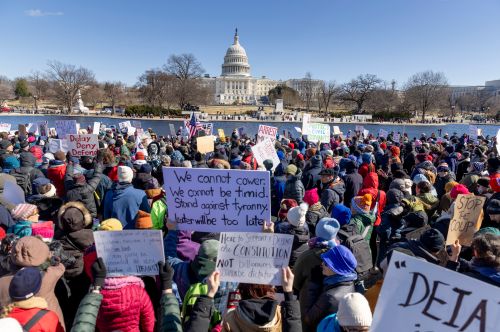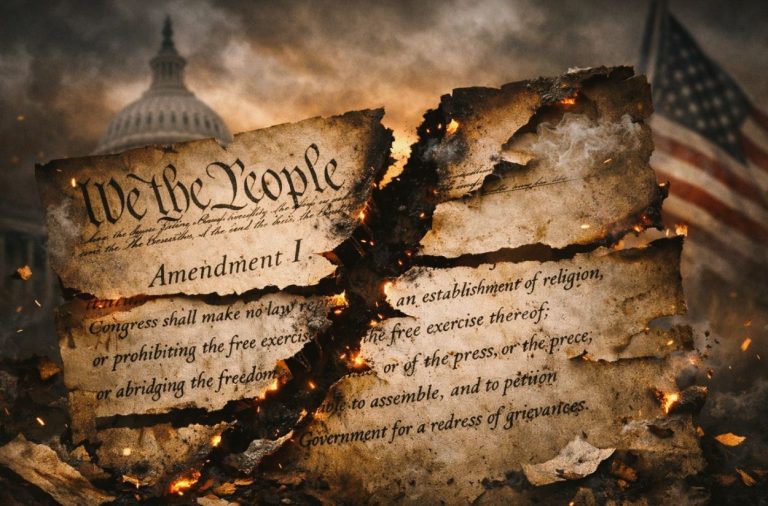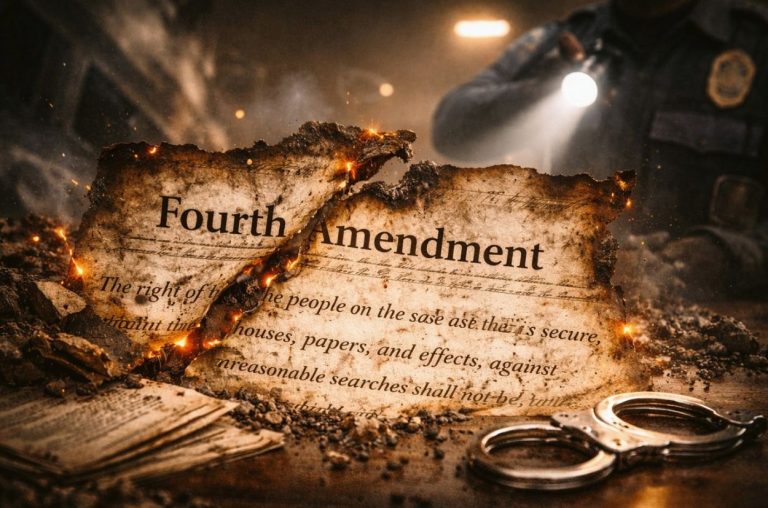

Authoritarianism succeeds not through strength, but through obedience. No leader, however ambitious or ruthless, can govern without compliance.

By Matthew A. McIntosh
Public Historian
Brewminate
Introduction
Under Donald Trump’s current presidency, the gravest risk of authoritarian drift lies not in rhetoric or executive decrees alone, but in whether the instruments of force, the United States military and law enforcement, will obey commands that violate constitutional limits. In theory, they are bound by oath to uphold the Constitution and to refuse manifestly unlawful orders. In practice, the question is whether enough in uniform will act on that duty, or whether compliance will become complicity.
Observers already warn of the peril. From the Global Policy Journal, “Whatever personal beliefs individual members of the armed forces may have, their first obligation is to respect the chain of command which culminates in the President.” Meanwhile, columnist Russ Baker cautions, “Generals will likely feel prohibited from … discussing whether they’re obligated to … refuse orders that contravene the Constitution … All of this creates fear and paralysis in our military … they become silent and do whatever they’re told.”
But the defense of the republic cannot rest solely on hope that enough officers will do the right thing. If they do, it must be reinforced by law, oversight, and citizen resolve. This article examines the constitutional obligations, institutional dynamics, and civic responsibilities that could determine whether America’s armed forces and police serve the Constitution, or an authoritarian will.
Legal and Constitutional Foundations
Every member of the U.S. military swears an oath not to a commander, party, or president, but to the Constitution. The language is explicit: “I will support and defend the Constitution of the United States against all enemies, foreign and domestic.” That oath, reaffirmed at every promotion, binds service members to legality above loyalty. The Uniform Code of Military Justice (UCMJ) reinforces this, requiring obedience only to lawful orders. Military members are bound to obey lawful orders, but they also have a duty to disobey orders that are patently illegal.
The distinction between “lawful” and “unlawful” is not abstract. Under both the UCMJ and American constitutional law, an order that violates the Constitution or statutory law is not lawful and must be refused. Under the UCMJ, troops are bound to disobey manifestly illegal orders. That doctrine was reinforced after World War II during the Nuremberg Trials, which established that “following orders” does not excuse participation in unlawful acts, a standard the U.S. itself helped create.
The same principle extends to civilian law enforcement. Officers swear to uphold the Constitution, and courts have long ruled that they cannot be compelled to carry out orders that infringe upon constitutional rights. Law enforcement officers must refuse to carry out orders that are clearly illegal, such as violating civil rights or using unlawful force. The U.S. Supreme Court has repeatedly affirmed limits on state power, from West Virginia v. Barnette (1943), which barred compelled political expression, to Youngstown Sheet & Tube Co. v. Sawyer (1952), where the Court rejected President Truman’s attempt to seize private industry without congressional authorization.
Together, these doctrines form the constitutional architecture that defines legitimate command. The American system presumes that those entrusted with force (soldiers, sailors, officers, agents) will act as constitutional guardians, not instruments of any single leader. The framers embedded civilian control of the military precisely to prevent a standing army from becoming an authoritarian tool. Yet this safeguard depends entirely on individuals recognizing where their duty truly lies.
Practical and Institutional Realities
The Constitution may define limits, but institutions and individuals determine whether those limits hold. Under Trump’s renewed presidency, observers warn that the U.S. military and law enforcement are being tested not only by orders themselves, but by internal pressures to conform. As Mark Beeson, Adjunct Professor in the Australia-China Relations Institute at the University of Technology Sydney, notes, “Whatever personal beliefs individual members of the armed forces may have, their first obligation is to respect the chain of command which culminates in the President.” The danger is that, in practice, this chain of command can become indistinguishable from blind obedience when constitutional red lines are blurred.
Analysts have also warned that institutional culture may discourage even the discussion of resistance. Baker continues, “Generals will likely feel prohibited from even discussing whether they’re obligated to refuse orders that contravene the Constitution … All of this creates fear and paralysis in our military … they become silent and do whatever they’re told.” Such paralysis, the article argues, is itself a form of complicity — one that authoritarian leaders rely upon to consolidate control.
This tension is not unique to the United States. The BTI Project has documented how, across regimes, militaries often determine the survival or fall of dictatorships. In virtually every case, it is the behavior of the military , not the opposition or international community, that decides whether a dictator’s endgame will be negotiated or violent. Autocrats depend on commanders who will follow orders without question; democracy depends on those who will not.
Law enforcement faces similar dilemmas, though often at the local or state level. Police officers are expected to enforce the law, not presidential will, but centralized pressure or politicized leadership can distort that role. Recent reporting warns that Trump’s allies have explored “loyalty tests” across federal agencies, including the Justice Department, to ensure alignment with presidential directives. The same article notes that “a campaign is underway to purge perceived opponents in the civil service and replace them with loyalists,” a move that could extend into the Pentagon and Department of Homeland Security.
In these conditions, even officers who understand their constitutional duty may hesitate. The cost of defiance can include dismissal, prosecution under military law, or public vilification as disloyal. Yet history shows that uncritical obedience carries a far higher price. Once a military or police force becomes politically captured, restoring neutrality, and democracy, can take generations.
The Role of Citizen Resistance and Civil Society
Even if parts of the military and police refuse unlawful commands, democracy cannot survive without civic resistance and institutional reinforcement. As Foreign Affairs cautioned, Americans must learn that the military by itself cannot save democracy from a reckless president. The burden of defending constitutional order ultimately rests with citizens, lawmakers, and the courts, not soldiers alone.
The United States has never faced a modern stress test of this magnitude, but democracies elsewhere have. A study by the Center for American Progress found that “democracies facing authoritarian threats from within have found ways to push back by strengthening institutions, reinforcing democratic norms, and building popular resistance.” The lesson is clear: institutional guardrails matter only if people choose to enforce them.
That choice begins with civic refusal to legitimize unlawful power. Constitutional scholars from Yale and Harvard have long emphasized that civil disobedience, when directed toward preserving lawful order rather than undermining it, can become a democratic defense mechanism. Historical precedent supports this: local officials and ordinary citizens have resisted unconstitutional edicts before, from illegal surveillance programs to attempts at voter suppression. What separates such actions from mere protest is their grounding in constitutional fidelity.
Law enforcement and the military, though uniquely positioned, are not the only ones capable of saying no. Civil servants, judges, journalists, and private citizens all play a role in refusing to normalize illegality. The BTI Project’s global research underscores this interplay: “The collapse or survival of democracy rarely depends on the army alone; it also depends on whether society at large accepts or resists the authoritarian narrative.” (bti-project.org)
When citizens refuse to comply with unconstitutional decrees (whether by legal challenge, organized protest, or simply by declining to participate) they reclaim agency from authoritarian control. A leader’s authority, after all, is only as strong as the willingness of others to enforce it.
Challenges, Risks, and Objections
The logic of resistance is morally clear but operationally fraught. No institution (military, police, or civil) is monolithic, and uncertainty surrounds how many would actually refuse an unlawful command. Surveys within the armed forces and law enforcement rarely probe political obedience directly, but several independent analyses suggest a worrying degree of polarization. The armed forces increasingly reflect the country’s partisan divisions, with senior leaders emphasizing the need to restore nonpartisan norms. A politically divided force complicates collective resistance.
Another danger lies in interpretation: who defines what is “unlawful”? The law provides guidance but not always immediacy. Commanders commanders are trained to recognize “manifestly illegal” orders, such as those requiring the targeting of civilians or the suspension of constitutional rights, yet gray areas remain when directives are cloaked in legal pretense. A president could frame repressive actions as national security measures, forcing subordinates to choose between duty and dissent without judicial clarity.
Institutional fear compounds the problem. Fear and paralysis can grip senior officers who know an order is wrong but lack protection if they refuse. Within law enforcement, officers who resist politicized mandates can face suspension, reassignment, or termination. Even when courts later vindicate them, the immediate personal cost discourages others from following suit.
There is also a structural risk: widespread refusal, if poorly coordinated, can fracture command authority and create the very chaos authoritarians exploit. Constitutional scholars have warned that resistance must be disciplined, rooted in law, not faction. If parts of the armed forces act independently without constitutional mandate, the result can be a de facto military intervention, not a defense of democracy.
Finally, the grim scenario remains: what if no one refuses? History shows that autocrats often succeed not because most people agree, but because most comply. Once obedience becomes habitual, the machinery of repression runs on inertia. Restoring democratic norms afterward can require decades of reckoning, if the opportunity ever returns.
Forward Strategy: Building Resilience and Preconditions for Refusal
Preventing authoritarian consolidation depends not only on courage in crisis but on preparation before it arrives. Institutional resilience, ethical training, and civic vigilance must be built into the system long before unlawful orders are issued.
Education and Constitutional Literacy in Uniform
Sustaining military professionalism in a polarized environment requires deliberate reinforcement of constitutional norms and civic education. Officers must be trained to recognize the difference between legal obedience and moral complicity. Regular seminars and scenario-based ethics programs can make the duty to refuse illegal commands a professional expectation rather than a personal gamble.
Institutional Safeguards and Oversight
Congressional and inspector general oversight mechanisms serve as the legal spine for accountability. The Brennan Center for Justice recommends statutory reinforcement of limits on presidential emergency powers to ensure that no executive can exploit vague authority to target opponents or deploy troops domestically without clear authorization. (brennancenter.org) Stronger review procedures, such as automatic sunset clauses on extraordinary powers, reduce the risk of abuse.
Whistleblower Protections and Safe Channels
Fear of retaliation silences resistance. The Project on Government Oversight (POGO) has repeatedly argued that whistleblower protections must extend to military and intelligence personnel who expose illegal activity. “Without reliable confidentiality and legal shields,” POGO writes, “even those who know an order is unconstitutional will hesitate to report it.” (pogo.org)
Civil Mobilization and Public Accountability
Institutional checks gain strength when reinforced by an informed and organized public. Citizen mobilization (through protests, legal challenges, and media scrutiny) is essential to raise the cost of authoritarian behavior and deter further violations. Public visibility makes it harder for unlawful actions to proceed quietly or normalize over time.
Cross-Sector Coalitions
Democratic defense is strongest when shared. Veterans’ organizations, legal associations, civil rights groups, and journalists can collaborate to monitor government overreach and support those who resist it.
Together, these measures form the scaffolding of lawful refusal, a structure that allows individuals in power to act with conscience without being destroyed by the system they serve. The United States has the legal framework for such resilience; what remains uncertain is whether its institutions and citizens will reinforce it before the next test arrives.
Conclusion
Authoritarianism succeeds not through strength, but through obedience. No leader, however ambitious or ruthless, can govern without the compliance of those who hold the weapons and enforce the laws. The framers of the U.S. Constitution understood this, which is why every oath of office binds loyalty to the document, not to a person.
Today, that oath faces its hardest test. As Donald Trump exercises presidential power again, the question is not abstract: will those in uniform, and those with badges, uphold their duty to the Constitution if ordered to violate it? The answer will determine whether the republic endures or erodes into command rule.
But the responsibility does not rest with them alone. No democracy can rely on its military to save it. Preservation of liberty depends on active resistance: from citizens, lawmakers, judges, and journalists who refuse to normalize illegality. The defense of democracy begins not in barracks or police precincts, but in civic conscience.
History shows that the turning point in every authoritarian rise is the moment when people stop saying no. The refusal to comply (by officers, civil servants, and citizens alike) is not rebellion; it is fidelity to the very law that binds the nation together. Whether that fidelity holds will define not only the character of those who serve, but the survival of American democracy itself.
Originally published by Brewminate, 10.10.2025, under the terms of a Creative Commons Attribution-NonCommercial-NoDerivatives 4.0 International license.


